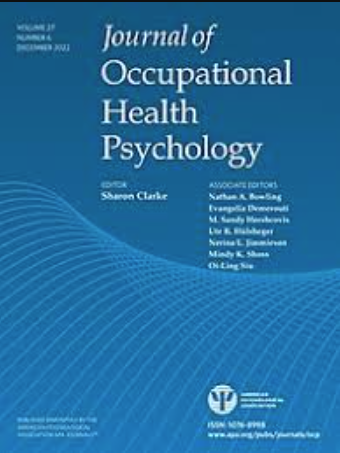Childhood psychological maltreatment and work-family conflict throughout adulthood: A test of self-concept and social mechanisms.
IF 3.9
1区 心理学
Q1 PSYCHOLOGY, APPLIED
引用次数: 2
Abstract
This study uses a life course stress and attachment framework to examine the relationship between childhood psychological maltreatment and adulthood work interference with family (WIF) and family interference with work (FIW). We analyze longitudinal survey data across 20 years collected in the Midlife Development in the United States (MIDUS) study (N = 307). We suggest childhood psychological maltreatment is associated with reduced perceptions of control (decreases in mastery, increases in perceived constraints) and social support (reduced supervisor and spouse support), which are then positively associated with WIF and FIW levels and increases over 20 years. Consistent with attachment theory, psychological maltreatment is associated with increased levels of WIF and FIW in adulthood through increased levels of perceived constraints and reduced levels of supervisor and spouse support. Results do not show support for life course stress proliferation ideas that suggest psychological maltreatment should be indirectly associated with escalating WIF and FIW over time. Our study illuminates novel developmental mechanisms that link childhood experiences with chronic WIF and FIW in adulthood. Our findings extend the known implications of psychological maltreatment to managing two central adulthood roles: work and family. (PsycInfo Database Record (c) 2022 APA, all rights reserved).儿童期心理虐待与成年期工作-家庭冲突:自我概念和社会机制的检验。
本研究采用生命历程压力与依恋框架,探讨儿童期心理虐待与成年期工作干扰家庭(WIF)和家庭干扰工作(FIW)的关系。我们分析了在美国中年发展(MIDUS)研究中收集的20年纵向调查数据(N = 307)。我们认为,儿童时期的心理虐待与控制感降低(控制能力下降,感知约束增加)和社会支持(主管和配偶支持减少)有关,这与WIF和FIW水平呈正相关,并在20年后增加。与依恋理论一致,心理虐待与成年后WIF和FIW水平的增加有关,这是通过增加感知约束水平和减少主管和配偶支持水平来实现的。研究结果不支持生命过程压力扩散的观点,即心理虐待与WIF和FIW随着时间的推移间接相关。我们的研究阐明了将童年经历与成年期慢性WIF和FIW联系起来的新的发展机制。我们的研究结果将已知的心理虐待的影响扩展到管理成年人的两个中心角色:工作和家庭。(PsycInfo Database Record (c) 2022 APA,版权所有)。
本文章由计算机程序翻译,如有差异,请以英文原文为准。
求助全文
约1分钟内获得全文
求助全文
来源期刊
CiteScore
8.20
自引率
5.90%
发文量
46
期刊介绍:
Journal of Occupational Health Psychology offers research, theory, and public policy articles in occupational health psychology, an interdisciplinary field representing a broad range of backgrounds, interests, and specializations. Occupational health psychology concerns the application of psychology to improving the quality of work life and to protecting and promoting the safety, health, and well-being of workers. This journal focuses on the work environment, the individual, and the work-family interface.

 求助内容:
求助内容: 应助结果提醒方式:
应助结果提醒方式:


